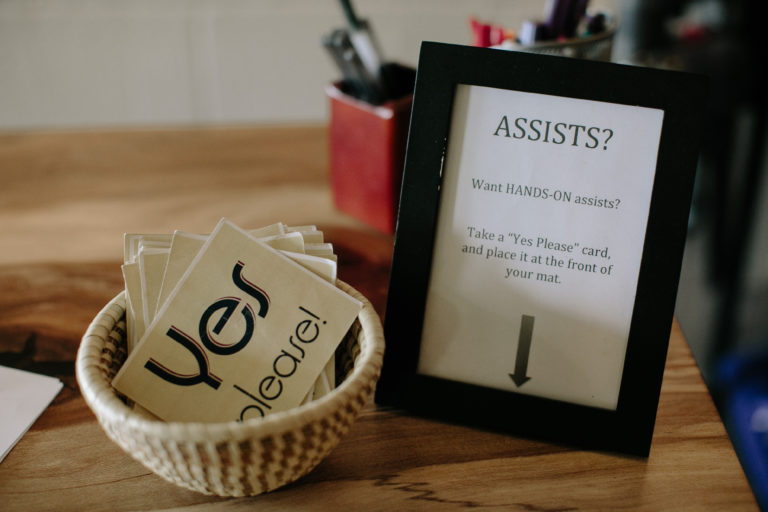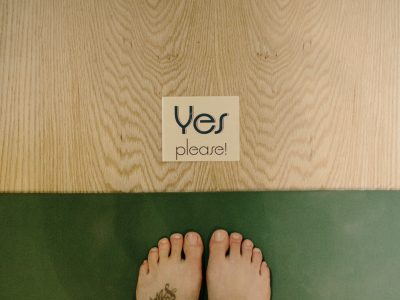
Dear Spacious Heart Community,
At Spacious Heart we believe that your body and the space around it is sacred. In a time when many brave people are telling the stories of the injustices, violence and harm they have experienced by unwelcome touch from others, we know it is important to make clear our expectations of care for the people that trust our teachers and studio. We hope that people who come to Spacious Heart feel welcomed to explore their bodies and breath and feel safe doing that in the space we offer. To help build that trust and security, we have created a policy around welcome touch.
We know that many yoga students learn to appreciate the skilled assists teachers can offer. These assists help them engage yoga asana (poses and movement) with proper alignment and muscle engagement. A good assist can enliven a pose and help a practitioner keep learning about their body and self. We are thankful that many of our students have built trust with their teachers and welcome this kind of touch regularly.
At the same time, we know that anyone can enter our studio with a known or unknown trauma seeking healing and health. For many people, trying yoga for the first time can be quite vulnerable. A new student walks into an unfamiliar space with unfamiliar people and their teacher invites them to move their body into unfamiliar positions. We know that this alone can cause anxiety. Then, if a (even well-intentioned) teacher approaches in a class to correct their alignment or provide therapeutic touch, this could at the least increase the student’s self consciousness and discomfort and at worst trigger a trauma response for which the student does not have the time, space, or resources to appropriately process in class.
We know that practicing agency and consent in regard to personal space and accepting or declining touch is an important part of trauma prevention and healing. For this reason, we invite all students to indicate their preference with a card. You may read the Welcome Touch card policy below.
We know that there is no perfect response to or prevention of trauma and this is our best first step toward increasing awareness and a culture of consent. We are open to feedback and suggestions to make your experience more comfortable and encouraging. We hope that this policy will grow as we grow to be more reflective and adaptive to our yoga community.
FAQ’s
Here are some frequently asked questions about this practice:
If I trust my teacher already, why should I have to use a card every time?
- First, we’re so glad you trust your teacher and find assists helpful!
- We need you to use a card to uphold the environment of consent for new students. If a new student sees a teacher touch someone without a card, they cannot trust that if they do not want an assist they will be respected in that choice.
- We invite you to use a card whenever you welcome touch to practice self-awareness and attunement to what best helps your practice each day. Reflect on these questions:
- When do you most appreciate assists?
- What type of assists do you find helpful?
- Are there times when having personal space helps you tune in better than an assist does?
- It may be that every answer leads to welcoming touch, so using the card is a way to celebrate that trust and openness. Your reflection on this and feedback will help our teachers know how to make your experience better.
What if I’m uncomfortable making a public display of my choice in this way?
- You are not required to use a card. If you do not, the teacher will respect your personal space and will not touch you.
What if I change my mind in the middle of class?
Your teacher will bring the bowl of cards into class, so that if you decide you do want touch during class you may place the ‘Yes’ side up by your mat.
If you have a card with ‘Yes’ turned up, you may change this to ‘No’ during class.
- No matter what your card says, you have the right to decline any touch that’s offered during class. Your teacher will ask permission before touching you, so you may give this consent.
What kind of touch are we talking about?
- The most common forms of touch that yoga teachers use are assists to help you feel and move into the most helpful alignment for a pose i.e. a hand on your arm, a foot next to your foot, and sometimes therapeutic massage or grounding touch in child’s pose or during savasana.
What if I notice a teacher does not follow this policy?
Please notify the studio owners if you experience inconsistency in following this policy. To allow for anonymity, we have a box for feedback outside the studio in which you may leave an anonymous feedback form.
|

Welcome Touch Policy
In accord with “A Yoga Teacher’s Code of Ethics,” to protect students and teachers from the ramifications of unwanted physical touch, Spacious Heart Yoga teachers and students use Assist Cards to maintain clarity regarding students’ consent for physical touch during class.
Spacious Heart Yoga teachers will encourage students before class starts to use a Physical Assist Card to signal if they welcome touch during class. Students may place the card with “Yes, Please!” face up if they welcome touch. Students may place the card with “No, Thank You” face up if they do not welcome touch. If a student does not use a card, the teacher will not physically assist them during class, give them therapeutic massage, or ask for their consent for any type of touch during class. Students may change or remove their card at any time during class.
Before touching a student, teachers will ask the student if it is okay to touch them in the way they intend to or give the students a way of indicating if they decline. I.e. “Is it okay for me to touch your arm? May I place my hands on your back? I will be going around to give a grounding touch, please place your hand on your hip if you would rather not receive this.” etc.
In order to maintain consistency with this policy, even if a teacher has a rapport with a particular student, or an understanding that touch is generally welcomed by that student, it is still necessary for the student to use a card to indicate their consent and for the teacher to ask students before they assist them, so that teachers do not touch when touch is unwelcome, and so that other students, particularly new students, do not observe confusing inconsistencies.
If you experience unwelcome touch during class or inconsistency with this policy, we welcome your feedback either by e-mail or a written feedback form which can be found outside our door.
